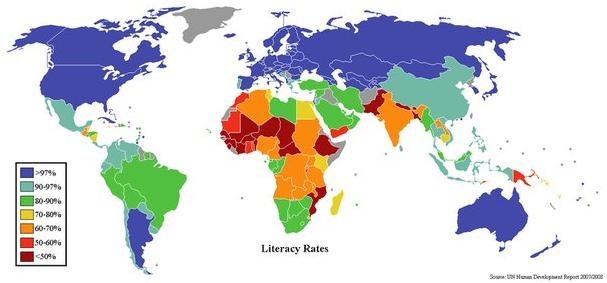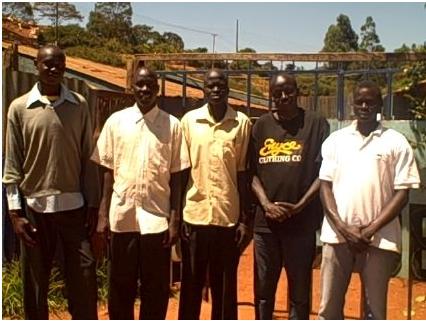Note: This is a guest post by Kellee Jacobs. Kellee has been working for the past year at the Sud Academy in Nairobi. Her experiences have been enlightening, but now she needs our help. Please contact her at kelleejacobs[at]gmail[dot]com if you would like to help or get involved in any way.
There is in existence a universal document that symbolizes the basic assumptions of what it means to be a human on this planet, interacting with those around us, and functioning as an individual embedded in small collections of other free-willed individuals. From a Hobbesian perspective, the world’s citizens have an intrinsic dog-eat-dog instinct, and as such, it is necessary to have bodies that design and enforce laws, guidelines and limitations on power in order to protect those of us who are unlucky enough to be born without an upper hand. This system of guidelines, and indeed laws, is called the Universal Declaration of Human Rights, and was enacted in 1948. For more than six decades these laws have existed, and for six decades, every country in the world has been complicit in violating, to varying degrees, their basic tenets. One among these is the right to education. Here is what the Charter says about it:
Article 26
1. Everyone has the right to education. Education shall be free, at least in the elementary and fundamental stages. Elementary education shall be compulsory. Technical and professional education shall be made generally available and higher education shall be equally accessible to all on the basis of merit.
2. Education shall be directed to the full development of the human personality and to the strengthening of respect for human rights and fundamental freedoms. It shall promote understanding, tolerance and friendship among all nations, racial or religious groups, and shall further the activities of the United Nations for the maintenance of peace.

Even a brief glance at the literacy rates map provided by the UN indicates an extreme inequity in the fulfillment of these laws. Education today is being treated as a privilege rather than a right. It’s a shameful hindrance to the advancement of our modern civilization and there is nowhere in the world where this is more evident than on the continent of Africa.
Plagued by famine, corruption, droughts, civil wars, disease, poverty and genocide, this continent has found it almost impossible to educate its population. I believe that this is the reason Africa has failed to leave tragedy in the past and catch up to the rest of the world. Knowledge truly is power, and it is something that is severely lacking in this corner of the world.
My experience here in Nairobi with the refugee students at Sud Academy has been an enlightening one. I have seen a thirst for education that is unprecedented anywhere else I have been. From what I can tell, education and knowledge are the most important tools the students wish to possess- this is their ticket out of war and disease, of hunger and idleness. They ask me to come early to teach them, and stay after dark so they can gain access to what little knowledge of the way things work that I have. They request I bring them my books from home, whatever the subject, or that I go buy them textbooks to learn about literature, history and religion to name a few. They demand I find them sponsors from the people at home so that they may continue learning until they become independent of hand outs. They say they must become doctors, lawyers, politicians and priests so that they can lead the way in a New Sudan, so they can guide their brothers and sisters, they say, into a freer world that focuses on the future rather than survival.
So you must imagine what it is like for me when I have to tell them I do not have access to thousands of dollars to help them all. As a self-proclaimed academic (I really like to think so, but it’s a wobbly true identity at best), it frustrates me to tell them I do not have the means to help. It angers me that they even have to ask, in a world where it is actually law for citizens to receive a basic education. And free at that.
Sud Academy’s funding for this year is less than it was in 2008. It’s no surprise, given the state of international financial markets, and the looming debt and bailouts that governments across the globe now face. Bank accounts shrinking, rising unemployment rates, less credit and more financial insecurity are all very real threats to economic stability, let alone growth. Explaining this complex web of how an interdependent world works falls on deaf ears here. “Do you still have a car? Do you still have a house? Are you able to buy rice? Do you have a toilet? Are you free from disease?” If the answers are yes, even to only some of these questions, most students at Sud Academy cannot possibly imagine being so lucky. Anyone who answers yes to all these questions is wealthy beyond their wildest dreams.
The point of my post, and the inspiration behind it, is this: there are five students at Sud who were supposed to have started their last year of high school on January 5, 2009. Without the funds to send them to another school, and without the facilities to educate them sufficiently at the modest (to be polite) school that are Sud, we have had to tell them “Sorry, you can’t continue and complete your high school education unless you find the funding yourself.” Confusion, disappointment and eventually persistent reapplications for sympathy and funding have been the result. I personally do not have the money to send them. I have promised them I would try to find other sources, and so here is my plea. It costs between $300 and $500 to send one student to a boarding school for an entire year. There are 5 Senior students that are eligible to continue this year. That is between $1,500 and $2,500. Providing food, shelter and education to 5 bright and promising students, this figure doesn’t seem impossible. I can attest to the dedication and interest, and also the desperation of these 5 students. Even though they have no textbooks, no teachers and even no classroom at Sud, they have shown up every day at school since January 5, hoping that I will bring good news with me each morning. When I tell them, “No, sorry- still nothing” they nod and smile politely and ask me to please try again.
If anyone is interested in sponsoring a student, or part of a student’s education at a respectable boarding school in Kenya, please contact me. It is not in my nature to ask people for money- I generally think it’s tacky and lewd. But inquiring minds in Africa deserve the same chance that Canadians receive, and I don’t think that because of their region of birth, the unfortunate result of poor governance or the cruel realities of war, a student should be denied access to the power of learning. For that reason, I hope we can manage to scrounge together and send these boys to school. It’s truly our responsibility as citizens of the world.
Thanks for taking the time to read- I hope I haven’t sounded like I’m begging, but any help would be greatly appreciated. Please contact me directly at kelleejacobs[at]gmail[dot]com if you would like to help in any way.
Here is a photo taken this week of the 5 boys who wish to begin their senior year of high school. (from left: Dennis Muyodi, Lino Madut, Kuot Madut Kuot, Abraham Manyok, Francis Bangoang)
















Absolutely amazing , well written. We take so much for granted, cliché or not, it is literally true. Kellee, you have enlightened so many lives with this excellent post. I am certain that not only will you have raised awareness but you will offer up the opportunity to all who want to be involved in something meaningful, a real chance to make a difference. Paying it forward is such a feel good place to be. Thank you for your diligence. You are a gift.
[...] gave me contact with, Kellee Jacobs a Canadian volunteer who bfought me to the school. She wrote The Right to Education – Sud Academy’s Case Study. I’ve posted photos from the school [...]
[...] gave me contact with, Kellee Jacobs a Canadian volunteer who bfought me to the school. She wrote The Right to Education – Sud Academy’s Case Study. I’ve posted more photos from the school [...]